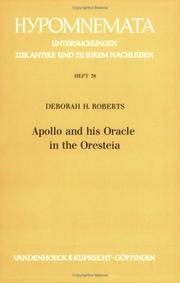| Listing 1 - 2 of 2 |
Sort by
|

ISBN: 3525251769 9783525251768 Year: 1984 Volume: 78 Publisher: Göttingen Vandenhoeck und Ruprecht
Abstract | Keywords | Export | Availability | Bookmark
 Loading...
Loading...Choose an application
- Reference Manager
- EndNote
- RefWorks (Direct export to RefWorks)
Apollo (Greek deity) --- Apollo (Griekse godheid) --- Apollon (Divinité grecque) --- Greek oracles --- Griekse orakles --- Oracles [Greek ] --- Oracles grecs --- Orakels [Griekse ] --- Orestes (Greek mythology) in literature. --- Apollo (Greek deity) in literature. --- Oracles, Greek, in literature. --- Prophecies in literature. --- Greek drama (Tragedy) --- Oreste (Mythologie grecque) dans la littérature --- Apollon (Divinité grecque) dans la littérature --- Oracles grecs dans la littérature --- Prophéties dans la littérature --- Tragédie grecque --- History and criticism --- Histoire et critique --- Aeschylus. --- Oracles, Greek, in literature --- Prophecies in literature --- Tragedy --- Aeschylus --- Orestes, --- Apollo --- In literature --- Apollo (Greek deity) in literature --- Orestes (Greek mythology) in literature --- Drama --- Eskhil --- Eschylus --- Aischylos --- Esquilo --- Eschilo --- Aiskhilos --- Eshil --- Æskílos --- Ajschylos --- Eschil --- Eschyle --- Äschylos --- Eskili --- Aiszkhülosz --- Eschylos --- Iskilos --- Эсхил --- אייסכילוס --- איסכילאס --- איסכילוס --- إيسخولوس --- ايسخيلوس --- Αἰσχύλος --- Views on prophecy. --- Oreste (Mythologie grecque) dans la littérature --- Apollon (Divinité grecque) dans la littérature --- Oracles grecs dans la littérature --- Prophéties dans la littérature --- Tragédie grecque --- In literature. --- Aeschylus - Oresteia --- Orestes, - King of Argos (Mythological character) - In literature --- Apollo - (Deity) - In literature --- Orestes, - King of Argos (Mythological character) --- Apollo - (Deity)
Book
ISBN: 0691068151 1322019266 9781400860876 1400860873 9780691068152 0691606579 9780691606576 0691635285 Year: 2014 Publisher: Princeton, NJ
Abstract | Keywords | Export | Availability | Bookmark
 Loading...
Loading...Choose an application
- Reference Manager
- EndNote
- RefWorks (Direct export to RefWorks)
Here James O'Hara shows how the deceptive nature of prophecy in the Aeneid complicates assessment of the poem's attitude toward its hero's achievement and toward the future of Rome under Augustus Caesar. This close study of the language and rhetorical context of the prophecies reveals that they regularly suppress discouraging material: the gods send promising messages to Aeneas and others to spur them on in their struggles, but these struggles often lead to untimely deaths or other disasters only darkly hinted at by the prophecies. O'Hara finds in these prophecies a persistent subtext that both stresses the human cost of Aeneas' mission and casts doubt on Jupiter's promise to Venus of an "endless empire" for the Romans. O'Hara considers the major prophecies that look confidently toward Augustus' Rome from the standpoint of Vergil's readers, who, like the characters within the poem, must struggle with the possibility that the optimism of the prophecies of Rome is undercut by darker material partially suppressed. The study shows that Vergil links the deception of his characters to the deceptiveness of Roman oratory, politics, and religion, and to the artifice of poetry itself. In response to recent debates about whether the Aeneid is optimistic or pessimistic, O'Hara argues that Vergil expresses both the Romans' hope for the peace of a Golden Age under Augustus and their fear that this hope might be illusory.Originally published in 1990.The Princeton Legacy Library uses the latest print-on-demand technology to again make available previously out-of-print books from the distinguished backlist of Princeton University Press. These editions preserve the original texts of these important books while presenting them in durable paperback and hardcover editions. The goal of the Princeton Legacy Library is to vastly increase access to the rich scholarly heritage found in the thousands of books published by Princeton University Press since its founding in 1905.
Epic poetry, Latin --- Prophecies in literature --- Optimism in literature --- Death in literature --- Languages & Literatures --- Greek & Latin Languages & Literatures --- History and criticism --- Aeneas (Sagenfiguur) in de literatuur --- Enée (Personnage de légende) dans la littérature --- Prophéties dans la littérature --- Voorspellingen in de literatuur --- Enée (Personnage légendaire) dans la litterature --- --Virgile, --- Énéide --- --Mort --- --Aeneas (Legendary character) in literature --- -Optimism in literature --- Rome in literature --- -Virgilio Marone, P. --- Vergilīĭ --- Vergílio --- Wergiliusz --- Vergilīĭ Maron, Publīĭ --- Verhiliĭ Maron, P. --- Virgilio --- Virgilīĭ --- Virgilius Maro, P. --- Virgil Maro, P. --- ווירגיל --- וירגיליוס --- ורגיליוס --- מרו, פובליוס ורגיליוס --- فرجيل --- Pseudo-Virgil --- Pseudo Virgilio --- Virgilio Marón, Publio --- Bhārjila --- Aeneas (Legendary character) in literature. --- Optimism in literature. --- -Views on prophecy --- Enée (Personnage légendaire) dans la litterature --- Aeneas (Legendary character) in literature --- 871 VERGILIUS MARO, PUBLIUS --- 871 VERGILIUS MARO, PUBLIUS Latijnse literatuur--VERGILIUS MARO, PUBLIUS --- Latijnse literatuur--VERGILIUS MARO, PUBLIUS --- Virgil. --- Rome --- In literature. --- Littérature --- --Thème --- Virgil --- In literature --- Death in literature. --- Prophecies in literature. --- Rome in literature. --- History and criticism. --- Mort dans la littérature --- Prophéties dans la littérature --- Virgil. Aeneis. --- Aeneas --- Aeneas -- (Legendary character) -- In literature. --- Epic poetry, Latin -- History and criticism. --- Virgil. -- Aeneis. --- Αἰνείας --- Aineias --- Enéas --- Эней --- Ėneĭ --- Еней --- Eneja --- Enees --- Eneo --- Énée --- Aeinéas --- Enea --- Enejs --- Enėjas --- Aineiasz --- アイネイアース --- Aineiāsu --- Eneasz --- Ajnejas --- Eneias --- Енеја --- Aeneis --- 埃涅阿斯 --- Ainieasi --- Thème --- Mort --- Epic poetry, Latin - History and criticism --- Virgil - Aeneis --- Virgile, 70-19 av JC --- Rome - In literature
| Listing 1 - 2 of 2 |
Sort by
|

 Search
Search Feedback
Feedback About UniCat
About UniCat  Help
Help News
News